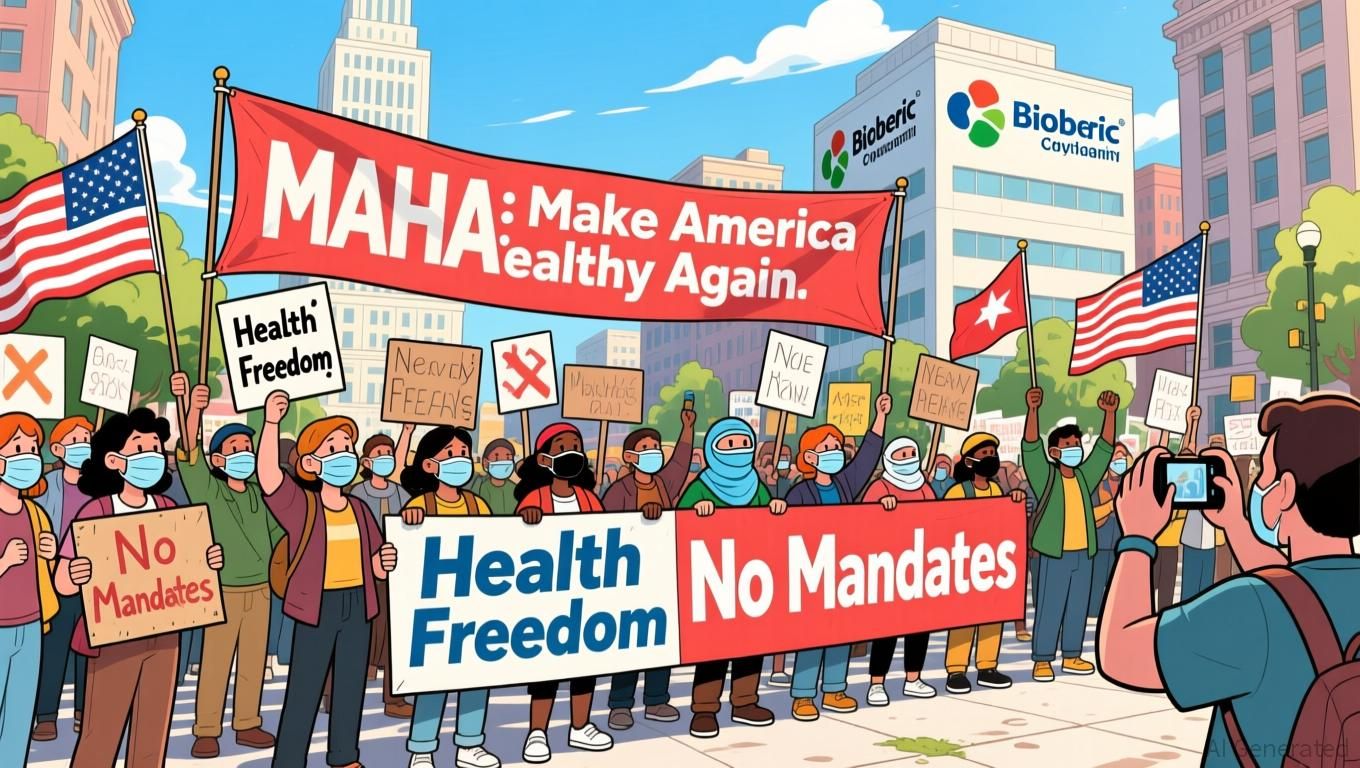MAHA's Struggle with Identity: Corporate Connections Versus Community Origins
- Robert F. Kennedy Jr.'s MAHA movement faces internal fractures as corporate partnerships and policy shifts alienate grassroots supporters. - Critics accuse the administration of abandoning anti-vaccine roots through $500M funding cuts and collaborations with biotech firms like Eli Lilly . - Former allies condemn MAHA's "identity crisis," while 67% public support persists despite warnings about coalition dilution from experts. - Kennedy defends pragmatic alliances as necessary for governance, but faces pr
Robert F. Kennedy Jr.'s "Make America Healthy Again" (MAHA) initiative, which once brought together anti-vaccine proponents and environmentalists, is now experiencing internal divisions due to conflicting goals and involvement with corporations. Grassroots members claim the leadership has abandoned its original mission, while Kennedy and his supporters argue that adapting to the realities of leadership is necessary to broaden the movement’s impact.
This discord became especially apparent this week as Kennedy was criticized by former supporters and dismissed staff. Gray Delany, who was removed from his position at the Department of Health and Human Services (HHS) in August, expressed on a podcast, "

The administration's balancing act has drawn further scrutiny.
Kennedy has sought to quell dissent, defending figures like White House Chief of Staff Susie Wiles and adviser Stefanie Spear against conspiracy theories suggesting they are undermining his agenda. "
Public support for MAHA remains robust, with two-thirds of Americans endorsing the initiative in a June Ipsos poll.
As MAHA navigates its identity crisis, Kennedy's ability to reconcile idealism with political pragmatism will determine whether the movement remains a force for change-or splinters into irrelevance.
Disclaimer: The content of this article solely reflects the author's opinion and does not represent the platform in any capacity. This article is not intended to serve as a reference for making investment decisions.
You may also like
PENGU Price Forecast 2025: Evaluating the Upside Potential in the Face of Uncertain Indicators and Market Fluctuations
- PENGU surged 12.8% in 24 hours, driven by Bitcoin's 4.3% rebound and rising altcoin market cap. - Technical analysis shows conflicting signals: short-term bullish momentum vs. long-term bearish Fibonacci levels. - NFT ecosystem growth (90% rebound from lows) contrasts with declining on-chain transactions (-12.67% weekly). - Bullish catalysts include Pudgy Party app success and ETF filings, while structural weaknesses persist in consolidation patterns. - Investors must monitor Bitcoin's trajectory, $0.029
Bitcoin News Update: VanEck Issues Bitcoin an Ultimatum—Adopt Quantum-Resistant Privacy or Face Withdrawal
- VanEck CEO warns firm may exit Bitcoin if quantum computing threatens its encryption and privacy model. - Privacy coins like Zcash gain traction as alternatives, using zero-knowledge proofs to address Bitcoin's transparency risks. - Quantum-resistant crypto market grows rapidly, with IBM-Cisco quantum internet project and PQC sector projected to reach $2.84B by 2030. - Regulatory shifts and institutional investments in altcoins signal evolving crypto landscape amid security and privacy challenges.

Bitcoin Updates: Stimulus Fails to Curb Crypto Fluctuations; Uncertainty Over Hedging Function
- Japan's $135B stimulus package failed to curb Bitcoin's decline below $85,500 amid heightened market volatility. - Analysts debate crypto's role as an inflation hedge, with Fundstrat's Tom Lee framing it as a leading indicator for U.S. stocks. - Brazilian firm Rental Coins' $370M BTC collapse highlights sector fragility, filing Chapter 15 bankruptcy to recover assets. - Security threats persist in DeFi, with Aerodrome Finance's front-end attack and Coinbase's routine wallet migrations underscoring risks.

Polkadot News Today: "U.S. Requires Female Crash-Test Dummies to Tackle Longstanding Gender Inequality in Safety Engineering"
- U.S. DOT mandates female crash-test dummies in federal safety testing by 2027-2028 to address gender bias in vehicle design. - THOR-05F, representing average adult women, replaces outdated 1970s models that left women 73% more likely to suffer serious injuries in crashes. - NHTSA emphasizes scientific validation for the 150-sensor dummy, while automakers and IIHS express skepticism about current safety standards. - Advocacy groups praise the move as critical for closing safety gaps, but activists warn de
